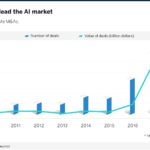The battle for Artificial Intelligence: tech titans rival to control the key technology of the future
The world’s tech giants are competing to dominate the field of Artificial Intelligence, which is likely to become the key technology of the digital economy. Who’s leading in this race and what consequences will it have?

For years now, the major technological companies have been relentlessly competing to dominate artificial intelligence and reap the benefits of its tremendous business potential. For these firms, the interest in developing AI serves a double purpose: to upgrade their current business processes while tapping into unexplored revenue streams.
The Oxford Dictionary defines Artificial intelligence as "the theory and development of computer systems able to perform tasks normally requiring human intelligence, such as visual perception, speech recognition, decision-making, and translation between languages." A specialized field within artificial intelligence is 'machine learning,' a system by which machines develop new AI skills by recognizing patterns through data without the need for specific programming. Both artificial intelligence and machine learning require three essential tools: data, computing power and algorithms.
Looking at these three basic ingredients of the recipe for artificial intelligence – a term that was coined in 1955 in the United States – it isn’t too hard to guess which companies are leading the race to dominate the technology: When it comes to combining huge datasets using the most sophisticated algorithms so that machines can 'think' and 'learn to think,' very few companies can compete with the likes of Alphabet (Google’s parent company), Amazon, Microsoft or IBM.
Alphabet is one of the companies most committed to the development of artificial intelligence. Indeed, Google has already rolled out a number of AI-powered functionalities across many of its most popular platforms, such as Gmail’s Smart-Reply, capable of generating automatic replies to simple emails, or Google Photos’ automatic video and collage composing features. But the AI strategy that Alphabet is pursuing is far more ambitious, and two of its branches, TensorFlow and DeepMind, play a key role in it.
DeepMind was a 'startup' specializing in artificial intelligence that Google bought in 2014 for an estimated $500 million, despite its lack of significant products or substantial revenues. DeepMind’s most valuable asset was its workforce, which included CEO Demis Hassabis, one of the brightest minds in the AI landscape; and an ensemble of renowned AI and machine learning researchers and experts.
The acquisition of DeepMind by Alphabet marked the start of a new trend. As the following graph shows, in 2016 other large corporations, from Ford to Apple, began to acquire companies specializing in artificial intelligence, due to, among other reasons, their inability to attract and retain experts in the field.
And Google hasn´t stopped shopping: in 2016 it acquired Moodstock, a French startup that develops machine learning-based image recognition technology, and API.AI bot platform. In 2017, it bought the Indian startup Halli Labs. Overall, last year investors spent over $21.3 billion on AI startups, 26 times more than in 2016, according to the consultancy CB Insights.

TensorFlow is Google’s open-source AI 'software' library for developers. Other companies are launching similar initiatives, such as Amazon’s Sagemaker (a new platform that enables the development and training of neural networks) and Facebook’s Pytorch and Caffe2, the former with a more scientific approach and the latter more product-oriented.
But why would Alphabet be interested in opening up a technology that is key for its future? To strengthen Google Cloud. The easiest and most predictable outcome is that all open developments with TensorFlow will be uploaded to Google Cloud, a strategic business unit for the firm, in an attempt to compete with Azure and Amazon Web Services, which respectively are Microsoft’s and Amazon’s successful cloud platforms.
The cloud strategy
Like Google, Microsoft and Amazon also expect to increase profitability and enhance their cloud services through artificial intelligence. Their strategy is to allow other companies – which are unable to develop AI solutions at that level – to access their cloud-based AI services through APIs. One example of this is an app recently developed by Microsoft for the facial recognition of Uber drivers.
And in this field of business competition, IBM is the outsider. Watson, the AI platform that IBM developed at the start of this decade, has been making headlines for years. Although it has been said that "the only intelligent thing about Watson is its PR team," the truth is that it has developed very interesting AI applications in a variety of areas, such as the fashion industry and the fight against cancer. These solutions are just some of the results of a huge financial bet: From 2010 and 2015 alone, IBM invested $15 billion in Watson and spent another $5 billion acquiring companies specialized in artificial intelligence.
The figures are huge, and the tech-giants are leaving little room for anyone else. Will they manage to make their efforts pay off? Many of the most promising, but still emerging, technological innovations - virtual assistants, smart speakers, driverless cars, virtual reality ...- depend on the development of artificial intelligence. Having the most powerful digital brains can mean being the company that dominates the future.